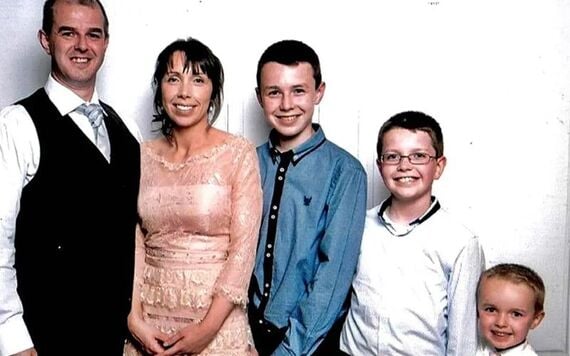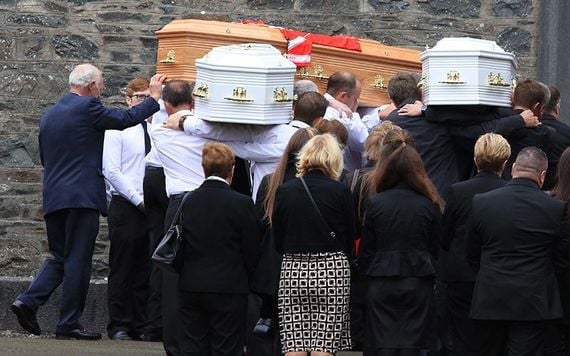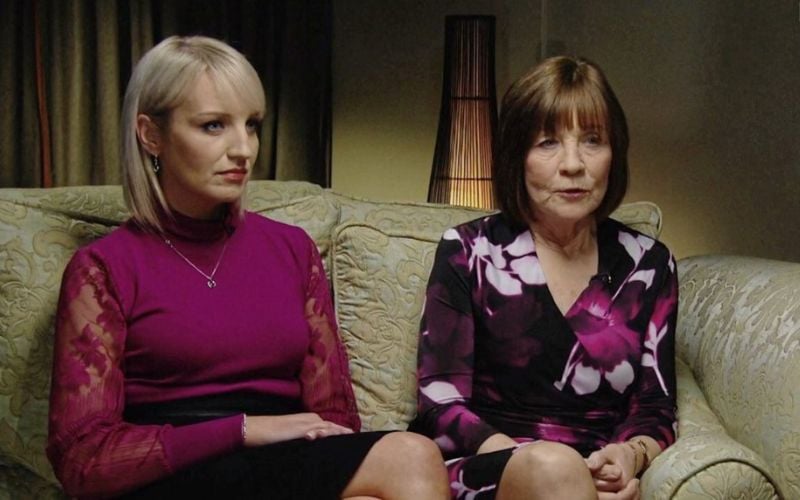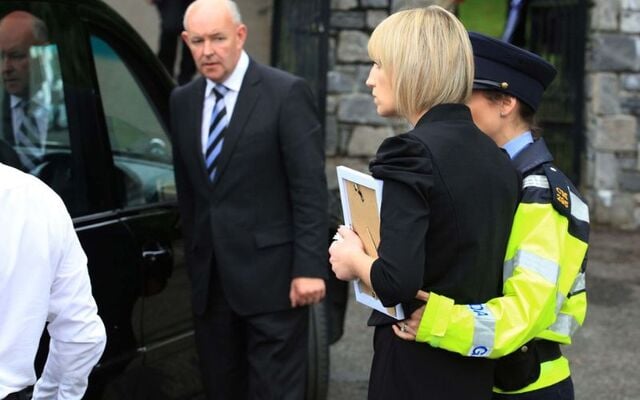Although always there for each other in times of trouble, which their family has experienced more than their fair share of, the relationship between the two sisters in adulthood had become distant and strained at times.
Jacqueline is unequivocal about the reason why – Clodagh’s husband, Alan Hawe. "He judged me all the time, and it worked," she says. "I stayed away."
Clodagh was 17 when she met Hawe, when they were both training to become primary school teachers in Dublin. Their relationship was serious from the start, and in the summer of 2000, they were married.
It was an intensely insular kind of marriage, with Clodagh rarely doing anything or going anywhere without her husband. She made it clear to her sister that if she told her something, she was also telling Hawe.
There were no private sisterly moments or confidences. Indeed, Jacqueline found out after Clodagh’s death that she’d been forwarding all her texts to Hawe as soon as they were received.

Alan Hawe with his wife Clodagh and their children Liam, 13, Niall, 11 and Ryan, six, who died in a suspected murder-suicide at their countryside house in Co Cavan.
Hawe, Jacqueline believes, controlled his family utterly. And Clodagh, who craved stability, trusted him implicitly.
However, in the spring and summer of 2016, it would seem things had begun to unravel for Hawe. It later emerged that he believed his standing in the south Cavan community where they lived with their three children – Liam, 14, Niall, 11, and six-year-old Ryan – was about to be badly damaged. But no one could have predicted the heinous actions the then 40-year-old would take to make sure his family continued to respect him.
On the night of 28 August 2016, using knives and an axe, Hawe murdered his wife and their three children at their home in Barconey, about 10km west of the town of Virginia. The full details of how they died are excruciatingly gruesome and brutal.
Read more
After spending several hours transferring money into different bank accounts and writing a long, rambling letter in which he confessed to killing his family, Hawe then hung himself.
The following morning, Clodagh’s mother, Mary Coll, was supposed to be minding two of the boys. When they failed to show up at her house, and she couldn’t get Clodagh on the phone, Mary drove over to their home. There was a note pinned to the door, saying the guards [police] should be called and not to go in. Thankfully, Mary heeded the message.
It remains one of the most shocking cases of familicide, or family annihilation, this country has ever seen.

The coffins of the Hawe family being carried into their funeral Mass.
In the years since, Jacqueline and her mother Mary have fought ferociously to get answers to questions around Hawe’s reasons for murdering his family, and for access to details about the months leading up to the killings.
They’ve been vocal in their criticism of the first Garda investigation into the case, and effusive in their praise of the subsequent Serious Crime Review, which took four-and-a-half years. They’re still lobbying to have the full report publicly released, as they believe the findings could help prevent other similar crimes from happening again.
As part of her ongoing campaign to try and ensure other parents and siblings don’t have to experience the same level of trauma that her family did following the deaths of Clodagh and her sons, Jacqueline has written a book, Deadly Silence, which was released this week.
While intensely tragic, it is also a testament to the love shared between Clodagh and her mother and sister, and the incredible resilience of the human spirit.
Sitting in the lobby of a hotel on the outskirts of Virginia, Jacqueline has an impressive presence. She holds your gaze intently as she goes through the details in her book, and despite the harrowing content and the extraordinary adversities she has faced, she radiates positivity and strength.
"Every event we’ve gone through, we’ve gotten on with life," she says. "I wouldn’t say we’ve moved on because you don’t from grief. But you refocus and begin to rebuild yourself again."
Although Clodagh was four years older than Jacqueline, during their childhood the sisters were close. Their parents’ marriage was volatile and Clodagh in particular had serious issues with their father. After leaving home for college, she rarely saw him again.
These difficulties, Jacqueline says, helped forge a strong bond between them. "Clodagh was very much the carer, she was very motherly and always looking out for us all," she says.
But the dysfunction in their home growing up, she believes,
also led Clodagh to looking for something stable in adulthood.
"I really and truly believe that your childhood shapes your decisions," says Jacqueline. "I was left with an eating disorder, and Clodagh trusted Alan Hawe when he said he’d look after her."
Jacqueline describes the young Hawe as being sensible, a non-drinker, religious and traditional, everything their father wasn’t. Clodagh was smitten from the start.
"At the beginning, I did respect him and had a bit of fun, but that was very short-lived," says Jacqueline. "When they got engaged, I was happy for them, I’d no real concern. That came later."
The relationship between the sisters became strained around the time of Clodagh’s wedding, when Hawe insisted on going bridesmaid dress shopping with them. Jacqueline, then a self-conscious teenager, refused to go.
Read more
"She was dazzled by him, whatever he said went," says Jacqueline.
The couple settled in South Cavan, Hawe got a job as a vice-principal in a local primary school, while Clodagh got a job teaching in another school about 40 minutes from their home.
In the meantime, Jacqueline had met her future husband, Richie Connolly, through work, and the couple moved into a house together in Kildare.
Out of the blue, the Coll family experienced their first great tragedy. In 2010, their younger brother, Tadgh, killed himself at the age of 26. They still have no idea why. Then three years later, when Jacqueline was pregnant with their first child, Richie, also died by suicide.
"That’s the one chapter I can’t get through without crying," says Jacqueline with a small sigh.
"Finding Richie. Every time I read it, I’m back to being that 32-year-old pregnant woman in our house in Kildare. I don’t tend to think about it a lot to be honest. I’ll never understand why Tadgh and Richie decided to go."
Clodagh proved to be a great comfort to Jacqueline after Richie died, and she persuaded her to move back to Cavan to be close to her family. She lived with their mum, Mary for a year, before finding a house near Virginia for herself and her infant son, Gary, who is now 11 years old.
While she rarely got to spend time with Clodagh on her own and felt restricted in what she could share with her because she knew it all went back to Hawe, Jacqueline did see her sister and her nephews a fair bit.
She describes movingly in the book each of the boys’ distinctive personalities and how the last time she saw them all was ten days before they died, when she called to their home and Hawe happened to be out.
"I still know Liam’s friends to see," she says. "They’re finished college and are all in jobs, one of them worked in the same place as me in the HSE. I always wonder what he’d be doing now, he was so intelligent, they all were."
She says that while she doesn’t believe there was ever any physical violence in the house, both Hawe and Clodagh were strict parents.
"Alan would lord his authority over them," she says.
"He’d say things like, 'Am I speaking in a foreign language?' if they didn’t do something straight away. I can’t say the atmosphere in the house was ever bad when I was there. And we must be careful that what happened [the murders] doesn’t overshadow what was really there."
That last afternoon she spent with Clodagh, they discussed the upcoming anniversary of their brother’s death.
"The kids were playing with Gary in the sitting room as we chatted," she says. "I remember Ryan was shooting Nerf bullets at him. He was very young, not even three, but he does remember them."
She had to tell Gary a few years ago the truth about what happened to his aunt and cousins.
"Someone had said something to him in school," she explains.
"He asked me what happened and I had to tell him the truth, that Alan killed them. You have to build that trust – I did it in an appropriate way, I brought in a psychiatrist and it was done through play therapy."
Jacqueline’s book provides an extraordinary insight into the effects of such a cataclysmic crime. Not least, how it changes people’s perceptions of those left behind.
Read more
"People make assumptions about you, that you must be damaged because of the trauma you’ve been through," she says.
"Some people will avoid you, and that’s ok. But others will make comments, I’ve heard them, 'how can she be normal?' But that’s a lack of education around trauma.
"I feel very strongly that I had goals and dreams long before Alan Hawe murdered my family, and I’ve continued to move on and be as happy as I can for Gary’s sake. I don’t want him to grow up and say my mother was always crying, she was always down and have his future shaped by that."
There is another major theme that runs right through Jacqueline’s book – her family’s disappointment with the initial investigation into the murders.
"It’s why I wrote it," she explains.
"It’s very important that the failings of the first investigation are outlined, and the huge learnings from the Serious Crime Review, that team was fantastic, I can’t say enough good things about them."
After years of feeling stonewalled by the Gardaí, Jacqueline and her mum appeared on the "Claire Byrne Live" television show in 2019 to explain why they wanted a review of the case.

Jacqueline Connolly and Mary Coll speaking on RTE about Clodagh's murder.
Among the issues they highlighted was how they weren’t given the letter Hawe wrote shortly after he killed his family until 16 months after the murders.
They also disputed expert evidence that concluded he was depressed, and this had developed into psychosis, which led him to murdering his wife and children.
The entire investigation was flawed from the beginning, says Jacqueline.
|There was the mindset for a start," she says. "The criminal was dead, so that shaped how the investigation went. If the perpetrator was alive and going to be convicted or put on trial, it would have been very different."
She says vital bits of evidence were never collected or were thrown out too soon, including CCTV footage that might have proved if Hawe went to the school where he was vice-principal that night.
His letter suggested he’d been experiencing difficulties at work, and he may have gone there to hide or destroy evidence. But Jacqueline and her family still don’t know the full truth.
After appearing on the Claire Byrne programme, they were granted a Serious Crime Review, which took four-and-a-half years. It was a completely different experience.
"We were confident they were going down every avenue," says Jacqueline. "They communicated with us regularly."
The review concluded that Hawe put a lot of planning into killing his family. It’s believed he reacted badly after his "rampant porn addiction" was discovered, something Clodagh had confided to her mother about six months before she died. Although Hawe agreed to go to counselling, Jacqueline believes Clodagh was thinking about leaving him.
"Social death was huge to Alan Hawe," says Jacqueline of the impact of someone experiencing the loss of their social identity.
"He showed traits of narcissistic abuse, where he thought Clodagh and the boys were an extension of himself and that he was doing them a favour [by killing them], it was an act of mercy.
"He thought they couldn’t live without him, that it would ruin their lives. But it wouldn’t. Richie’s suicide didn’t ruin my life; in fact, Gary and I are thriving, because that’s what Richie would want."
When I ask her what she misses most about her sister, Jacqueline begins to softly cry. "Those few chats we had before the end were lovely," she says.
"I miss what we would have had if Alan Hawe hadn’t controlled everything. We were never able to go for a coffee together or go shopping. I do think that maybe if he’d just taken his own life, Clodagh would have stood on her own, and could have come to Gary’s football matches with me, or we could have gone on holidays together, you know, done sister things."
"Deadly Silence: A sister’s battle to uncover the truth behind the murder of Clodagh and her sons by Alan Hawe" by Jacqueline Connolly, with Kathryn Rogers, is published by Hachette Books Ireland and is out now.
Read more
* This article was originally published on Evoke.ie.




Comments